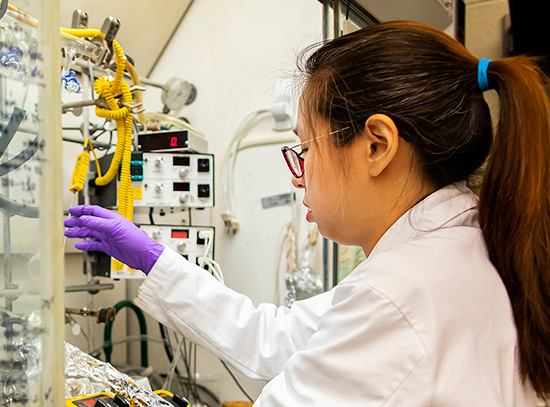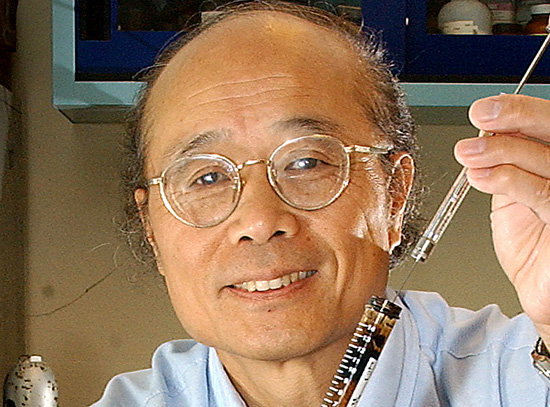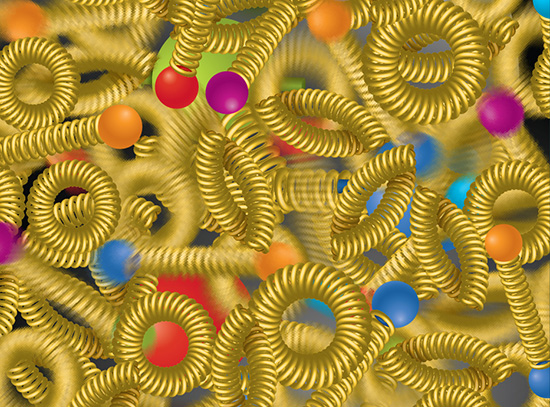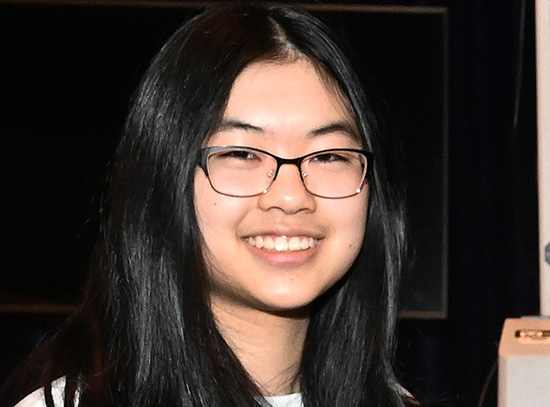From Imposter Syndrome to Belonging
Jeffrey Tejada shares his journey through educational programs at Brookhaven Lab—and to the National Diversity in STEM conference
February 20, 2024
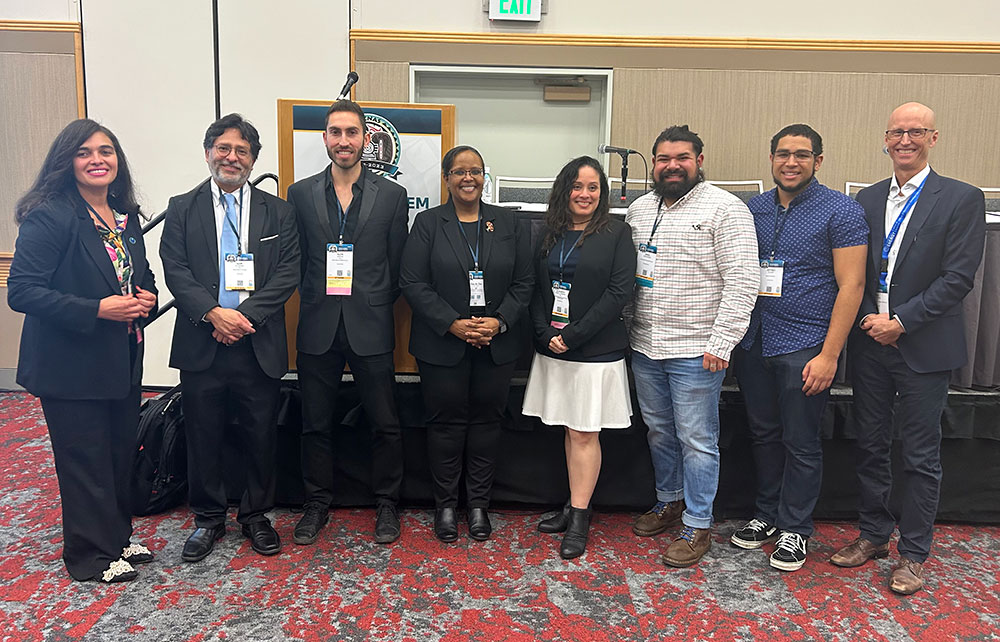 enlarge
enlarge
Brandi Toliver (far left), Asmeret Asefaw Berhe (4th from left), and Jeffrey Tejada (2nd from right) represented the Office of Workforce Development for Teachers and Scientists (WDTS) with other WDTS program managers and alumni at the 2023 National Diversity in STEM conference. (Aleida Perez/Brookhaven National Laboratory)
When planning for long-term research projects, scientists and program managers have to account for a multitude of factors, including the availability of funding, materials, and facilities. But most importantly, their teams need talented and motivated individuals who are well-trained in scientific and technical specialties.
That’s why the Office of Workforce Development for Teachers and Scientists (WDTS), part of the U.S. Department of Energy’s (DOE) Office of Science, provides training opportunities for scientists, engineers, technical professionals, and educators across the country. To ensure a sustained scientific workforce, representatives from WDTS prioritize outreaching to the next-generation of STEM leaders—especially those coming from diverse backgrounds. Part of this outreach includes raising awareness of the WDTS programs that exist to support and train these future leaders at all stages of their education.
Recently, a panel of WDTS program alumni and managers used storytelling to contribute to this mission at the 2023 National Diversity in STEM (NDiSTEM) conference. The conference, hosted by the Society for the Advancement of Chicanos/Hispanics and Native Americans in Science (SACNAS), “serves to equip, empower, and energize participants for their academic and professional paths in STEM.”
Among the panel speakers was Jeffrey Tejada, a third-year student at Brown University studying chemical physics. Tejada represented the DOE Science Undergraduate Laboratory Internships (SULI) program, which he had completed during the summer of 2023 at DOE’s Brookhaven National Laboratory.
“I really enjoyed my time as a SULI student and I know the internship could make a huge difference in the lives of other students, so I was happy to advocate for the program and share my experiences with other Hispanic students,” said Tejada.
It was Tejada’s accomplishments as a SULI student and the connections he made throughout the summer that brought him to Portland, Oregon, where the largest multidisciplinary and multicultural STEM diversity event in the United States was being held. But his path to NDiSTEM, and his journey through the pipeline of educational programs at Brookhaven Lab, had truly begun five years earlier.
An unknowing neighbor
Tejada grew up on Long Island and attended high school only 10 miles away from the Lab. Despite his proximity, Tejada was unaware of the award-winning research happening practically in his backyard.
“I wasn’t really the type of kid to look up at the street signs while I was in the car,” he explained. “I had heard of Brookhaven National Laboratory, but I didn’t realize it was right here on Long Island.”
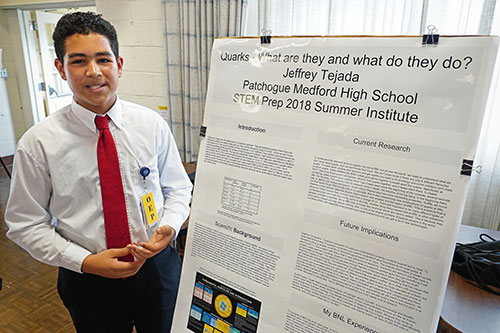
Jeffrey Tejada attended the STEM-Prep Summer Institute at Brookhaven National Laboratory during the summer of 2018. This was the first of several educational programs Tejada would successfully complete at Brookhaven Lab. (Alex Reben/Brookhaven National Laboratory)
Tejada had always loved science; he had taken 10th grade chemistry as a ninth grader on an accelerated track, but he would attend extra help sessions for the living environment course, which most ninth graders take, to spend time with friends and learn about other kinds of science.
The living environment teacher noticed Tejada’s passion for learning and took a special interest in him even though he was not her student. The teacher had recently received an email about a Brookhaven Lab program for ninth graders, called the STEM-Prep Summer Institute, and encouraged Tejada to apply. Tejada followed her advice and was accepted into the program.
“STEM-Prep is like an intro to science,” Tejada explained. Over four weeks, he got to learn about biochemistry, physics, environmental science, and computer science—with one week for each subject—alongside other ninth graders from underrepresented minorities in science.
“I could tell that Brookhaven was making an active effort to show us that people who look like us are succeeding in science,” Tejada remarked. “That was something I had never seen before. I rarely, if ever, saw people who looked like me in the science videos I would watch on YouTube.
“All of the sudden, this career path was so tangible,” he added. “STEM-Prep made me realize that I could be a scientist one day. It was then that I decided that I would become one—just after a lot more school.”
Being among more students who looked like him was also a unique experience for Tejada.
“It was just amazing to meet other Hispanic kids who wanted to pursue science,” he remembered.
He didn’t know it at the time, but attending STEM-Prep set the trajectory for a years-long pathway through educational programs at Brookhaven Lab.
“STEM-Prep made me realize that I could be a scientist one day. It was then that I decided that I would become one—just after a lot more school.”
– Jeffrey Tejada
Tejada returned to Brookhaven during the following school year to participate in the Student Partnerships for Advanced Research and Knowledge (SPARK) program. Through SPARK, Tejada, his classmates, and their science teacher got to conduct research on TBFAD-17—a protein from Mycobacterium tuberculosis—at the National Synchrotron Light Source II (NSLS-II), a DOE Office of Science user facility at Brookhaven Lab. The students planned to use the ultrabright x-rays at NSLS-II to conduct protein crystallography experiments on their samples and study the protein’s unknown structure.
“In February, we had set up these wells of protein in solution,” he recalled. “We were so excited to come back to NSLS-II the next month and see if our proteins had crystallized.” That next month, however, was March 2020, and the students were unable to conclude their research due to COVID-19 restrictions.
Tejada was disappointed that his time at Brookhaven had, seemingly, come to an unsatisfying end. But he knew his pursuit of science was only beginning. He applied early decision to Brown University and was accepted to study chemical physics starting in the fall of 2021.
“My experiences at Brookhaven undoubtedly helped me get into Brown,” Tejada remarked. “But more importantly, they relieved my imposter syndrome and gave me the confidence to apply in the first place.”
Email déjà vu—another educational opportunity at Brookhaven Lab
Tejada was in the middle of his second year at Brown when an unexpected email—addressed to him this time—piqued his interest.
Aleida Perez, who was the supervisor of student research and citizen science at the time, had reached out to successful alumni of the high school programs to tell them about Brookhaven’s Mini-Semester Program. During this week-long program, college students from traditionally underrepresented and underserved groups in STEM attend lectures and conduct experiments with Brookhaven scientists, engineers, and technicians.
Once again, Tejada followed the advice from an educator and applied to a program at Brookhaven Lab. Tejada was accepted into the program and enjoyed his return to the Lab. But he was not expecting the Mini-Semester to be as helpful as it was.
During the program, the students learned about circuits and even got to practice building them. Little did Tejada know, he would be taking an electricity and magnetism course at Brown later that year. The first lab assignment involved building circuits, just like those he encountered during the Mini-Semester Program at Brookhaven Lab.
“It was the fastest lab I’ve ever finished,” he added with a laugh.
More importantly, attending the Mini-Semester led to yet another opportunity. Shinjae Yoo, a computational scientist at Brookhaven’s Computational Science Initiative, offered Tejada a research project working with lattice quantum chromodynamics (QCD) for SULI the following summer.
Lattice QCD is one approach for studying the interactions between fundamental particles using computer simulations. This approach discretizes the space inside a nucleus so that quarks and gluons—the particles that make up protons and neutrons—can move from point to point, rather than within a continuous space.
“I met with my principle investigator at Brown less than an hour after I got the offer,” Tejada recalled. “Even though the science seemed very different from the chemical physics I was studying at school, the basic principles of the two fields were easily transferable. Accepting the offer was a no-brainer.”
Instead of working with quarks and gluons, Tejada was used to working with hydrogen atoms or large proteins.
“I didn’t know anything about particle or nuclear physics going into this project,” Tejada explained. “But I was able to apply some of my chemistry research skills, and now I know a thing or two.”
Though Tejada had been at Brookhaven Lab several times before, the collaborative nature of his peers and mentors stood out the most to him as a SULI student.
“I could just walk down the hall and there would be a group of people in an office who I felt comfortable asking for help,” Tejada recalled. “We could go work through different problems on a white board for hours. Everyone was just so generous with their time.”
Tejada was also impressed with the interdisciplinarity of the research tackled at Brookhaven.
“The scientists are working on these complex questions that require lots of talented individuals to get the job done,” he said. “The sense of teamwork at Brookhaven is quite different compared to anywhere else I have been.”
Though the research experience was invaluable—Tejada was even inspired to sign up for a machine learning course back at Brown—the connections he made as a SULI intern will last a lifetime.
“One of my favorite memories is driving down to the beach with a bunch of other interns. Although, the interns from Puerto Rico were not impressed with our Long Island beaches,” he joked. One of his friends even made the trip up to Brown during the following semester to visit Tejada.
Professional extracurriculars
Over the summer, Tejada attended the Professional Association Expo—a job-fair-like event during which leaders from more than 10 professional associations set up booths to network with Brookhaven staff and interns. Among the associations was SACNAS.
Tejada was a member of the SACNAS chapter at Brown University and was hoping to attend the society’s NDiSTEM conference scheduled for mid-October in Portland, Oregon. He had applied for a travel award scholarship earlier in the year but had not received it. So, he was eager for an opportunity to connect with representatives from the organization in person and look for other ways to make it to Portland.
The SACNAS representatives encouraged Tejada to continue persisting in his academic pursuits and efforts to attend SACNAS. So, Tejada successfully completed his SULI internship and returned to Brown for the fall semester with renewed motivation.
Only a few weeks after Tejada had left Brookhaven Lab, Brandi Toliver, a program manager for several WDTS programs, reached out to Perez. Toliver was organizing a WDTS panel for SACNAS and was looking for program alumni to join.
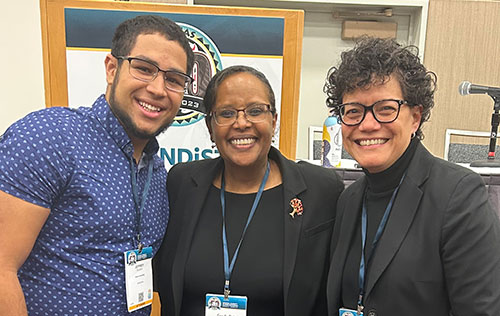 enlarge
enlarge
Left to right: Jeffrey Tejada, Asmeret Asefaw Berhe, and Aleida Perez attended the 2023 National Diversity in STEM conference in Portland, Oregon. (Aleida Perez/Brookhaven National Laboratory)
“I thought of Jeffrey immediately,” said Perez, who is now the manager of University Relations and DOE Programs for Brookhaven’s Office of Educational Programs (OEP). “So, I reached out to see if he would be interested in participating.
Once again, Tejada received an email containing the opportunity of a lifetime—Toliver invited him to attend SACNAS with DOE’s Office of Science and asked him to speak on the WDTS panel about his experience as a SULI student.
“I jumped at the opportunity, even though I was nervous to speak on the panel,” Tejada recalled. On the panel, he was joined by WDTS program managers, other WDTS program alumni, and DOE Office of Science Director Asmeret Asefaw Berhe.
“I was sitting next to a lot of important people,” said Tejada. “It felt really validating to be up on the stage with them, but I was definitely in a bit of awe.”
“It was so rewarding to have Jeffrey represent SULI and Brookhaven Lab,” added Perez. “Several years ago, we established ‘pathways’ for students, like Jeffrey, to stay engaged with the Lab and DOE throughout their education and career. Seeing him on the panel, after knowing him since he was a high school student, was a full-circle moment for me.”
After the panel and subsequent Q&A session, several panel attendees approached Tejada with more follow-up questions.
“I was about the same age as them, so it felt a little weird to be giving advice,” he said. “But I was so grateful to help out future scientists who come from similar backgrounds. We have to look out for each other and help each other out.”
From mentee to mentor
As a first-year student at Brown, Tejada was accepted into the Bonner Community Fellowship, a four-year program that matches students with a community partner to advocate for social justice and civic engagement. Tejada was partnered with the Providence Public Library.
“My assignment was to build a tutoring program from the ground up,” Tejada explained. “I did everything from recruiting the tutors to working with the students themselves.”
The program started with the intention of helping students with homework or studying, but it has grown into something much bigger. Many of the students are immigrants or children of immigrants, like Tejada. These students often don’t know if they should go to college or how to even begin the process of applying and writing essays. Tejada is eager to work with these students and share lessons that he learned while completing DOE programs.
“I see so much of myself in them. They experience a lot of imposter syndrome, just like I did before completing STEM-Prep,” Tejada said. “I am there to remind them that they belong and that they will succeed if they put their mind to it—just like I needed to hear when I was their age.”
Tejada often encourages his students to apply to WDTS programs, especially the ones that allow high schoolers to do research.
“I like to show them pictures I took at RHIC,” he said, referring to the Relativistic Heavy Ion Collider, a DOE Office of Science user facility for nuclear physics research at Brookhaven Lab. “The ones who are into STEM love that stuff, and they often don’t even know it exists until I tell them about it. I get to be the one to tell them they could work with a particle accelerator one day.”
Though Tejada does not know exactly what is next for him, he is eager to return to a national lab—for another internship and for his future career.
“I want to get into the nitty gritty. I want to push the frontier of what we know and what we can do,” he said. “Working at a national lab is great for research, but there are also a lot of outreach opportunities. Brookhaven does such a great job with educational outreach, especially with its open house tours.
“I’ve had a lot of people help me out in life, Aleida being one of them,” he said. “I can only aspire to do as much as I do because of other Hispanic scientists who have opened the door for me, and I hope to hold the door open for the next generation of scientists who look like me.”
Brookhaven National Laboratory is supported by the Office of Science of the U.S. Department of Energy. The Office of Science is the single largest supporter of basic research in the physical sciences in the United States and is working to address some of the most pressing challenges of our time. For more information, visit science.energy.gov.
Follow @BrookhavenLab on social media. Find us on Instagram, LinkedIn, X, and Facebook.
2024-21623 | INT/EXT | Newsroom




